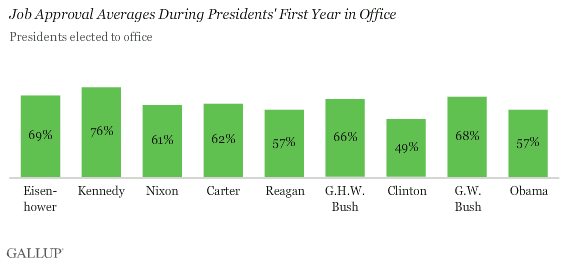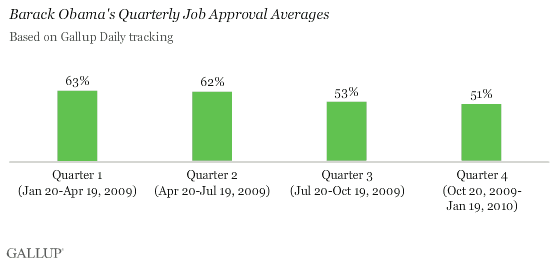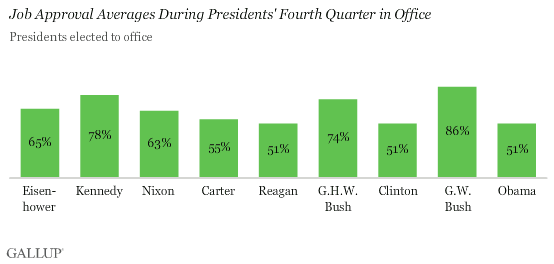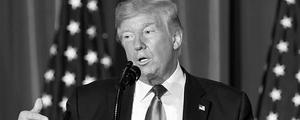PRINCETON, NJ -- Barack Obama averaged 57% job approval during his first year in office. Compared with the first-year averages of other presidents elected to office since World War II, Obama's average ranks on the low end, tied with Ronald Reagan's, but better than Bill Clinton's historical low of 49%.

"More recently, Obama's job approval ratings have hovered around 50%, averaging 51% for his fourth quarter in office."
When Obama took office, his initial approval ratings were among the highest Gallup has measured for a new president, and better than the early ratings for the more recent presidents. However, his public support dropped, with a sharp, nine-point decline in his approval rating from his second to his third quarter in office, marking one of the largest quarterly declines in Gallup polling history.
More recently, Obama's job approval ratings have hovered around 50%, averaging 51% for his fourth quarter in office.

Obama's 51% fourth-quarter average ties Clinton's and Reagan's averages as the historical low fourth-quarter ratings for elected presidents. George W. Bush had the highest fourth-quarter average as a result of the rally in public support for government leaders after the Sept. 11 terrorist attacks.

Harry Truman (50%) and Gerald Ford (48%) -- who were not elected to their first terms in office -- had slightly lower fourth-quarter averages than did Obama, Clinton, and Reagan.
Several factors likely contribute to Obama's recent slump.
Although U.S. consumers are more likely now than before Obama took office to say the economy is "getting better," they continue to give a dour assessment of current economic conditions and are still more likely to say the economy is getting worse than getting better. Obama's approval rating for handling the economy has declined over the course of the year and reached a new low of 40% in the most recent USA Today/Gallup poll. Poor economies may also have kept down Reagan's and Clinton's first-year ratings.
The decline in Obama's ratings seemed to accelerate when healthcare reform became the top domestic legislative priority in the late summer, and some members of Congress faced a backlash from angry participants at town-hall meetings to discuss the issue. The plan has struggled to gain majority public support, and Americans today give Obama a rather anemic 37% approval rating for handling healthcare.
Obama's attempts to improve the economy and expand health coverage have raised concerns among Americans about the dramatic increase in government spending and the federal budget deficit, and about the expansion of government power more generally.
Survey Methods
Results are based on more than 40,000 aggregated telephone interviews with national adults, aged 18 and older, conducted between Oct. 20, 2009 and Jan. 19, 2010, as part of Gallup Daily tracking. For results based on the total sample of national adults, one can say with 95% confidence that the maximum margin of sampling error is ±1 percentage point.
Interviews are conducted with respondents on land-line telephones and cellular phones.
In addition to sampling error, question wording and practical difficulties in conducting surveys can introduce error or bias into the findings of public opinion polls.
